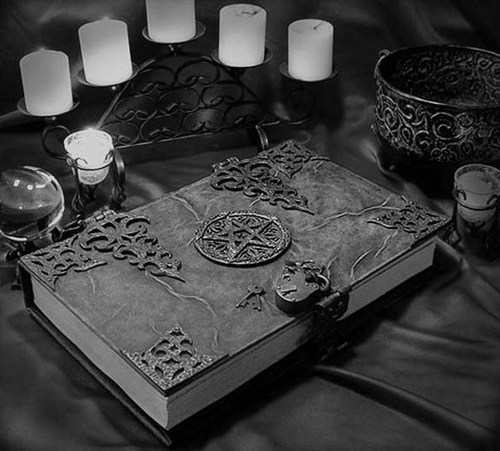 |
| Source |
The most exciting and (very rarely) dangerous science is done by geniuses in university laboratories or government locations. They act with the acknowledgement and approval of some governing body of officials or intellectuals, even if these experiments may be morally questionable to the public.
 |
| Source |
If your RPG magic is like science, then you can expect to find potions at your typical merchant's venue, and one or more of your PCs will probably have classical magic training in the form of a wizard college or monastic order. Practicing magic is not surprising, but practitioners of magic that are not part of the normal social structure are surprising and even cause for alarm. They may be hunted in the same way as those who intentionally use magic to cause destruction.
 |
| Source |
The taboo inherent with these forms of magic is always related to the sin involved with practicing them. Blood magic involves manipulating the human body as a resource. Necromancy does the same for dead bodies. Demon pacts are deals with evil entities, which will surely help the monster cause pain and suffering, at least to others.
 |
| Source |
All magic is done in secret, or in the open with impunity in the confidence that almost no one can stop the sorcerer unless they too plunge their hands in the muck. A mortal person using magic has the same effect as a villain in a movie that kills an innocent person, up close, without batting an eye.
Magic-use proves that the practitioner is willing to make morally abject choices to gain power and get ahead. It is sin in so far as it sells itself. No one has to be convinced as to the usefulness of magic. It draws practitioners in on its own undeniable results. Its pull is especially potent at the highest and lowest rungs of the social ladder, because those people are much more likely to be egomaniacal or desperate, respectively.
 |
| Source |
But the power...oooooh the power.
In a magic as sin game, the players must choose whether they are good, or powerful. Any path that rides the line has to be invented on the spot. The magic itself asks you to compromise your morals or deal with entities that you know are dangerous and deceitful. But your players will gladly risk their characters just to see how far the rabbit hole goes.
In a game with magic as sin, the details can't be written out, they have to be discovered. It's the foot-in-the-door technique. You already broke into this library's restricted section to sneak away with a black magic tome, why not try one of the spells out and drink the blood of a rabbit, just to see if you can really become the fastest man alive? And when that works, why not give the book to the crazy necromancer for the promised 1,000gp? He isn't gonna destroy your village, after all. And hey, why not sacrifice a whole city of people so you can be immortal, like it says on that page you accidentally ripped out of the book before you sold it? You've gone this far already, and besides, the necromancer is gonna turn them all into zombies in a month anyway...
 |
| Source |
But when power is inherently corrupting, then the conflict is natural: to preserve existence, the powerless must try to keep power in check, but the means by which to do that are pitiful compared to what the power can do.
And so for the players to be a force for good, they must truly be bright and steadfast, or they must flirt with evil without giving in completely.
Or if they are just muscle for hire looking to make a buck, the temptation of magic is the choice between a modest existence, and potentially infinite wealth (perhaps) at the cost of one's soul.

